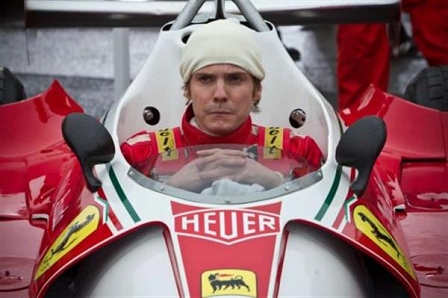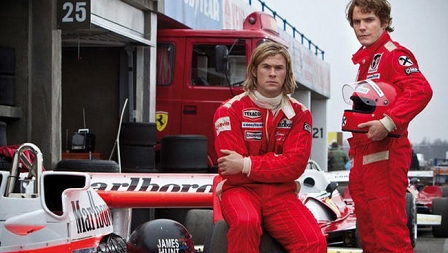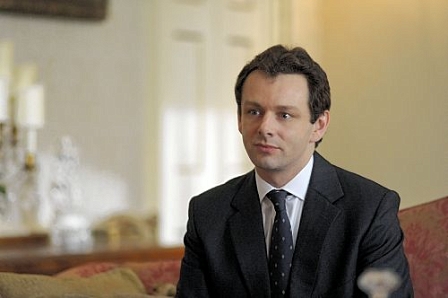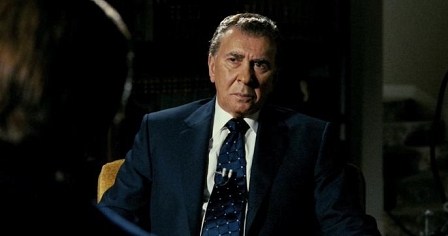Erstellt am: 5. 10. 2013 - 06:00 Uhr
"The Truth is All Important"
The Formula One film Rush, released in Austrian cinemas this week, tells the real-life story of the rivalry between Austrian grand prix driver Niki Lauda and his British adversary James Hunt.
Der Rausch der Runden
Christia Fuchs' Rezension von "Rush"
Hunt is played by Chris Hemsworth as a flamboyant, hard-drinking, womanizing play boy - like Austin Powers in a race helmet. Niki Lauda, played by Daniel Brühl, is an ultra-serious, sober and calculating perfectionist. A driver who is so driven that the will change the face of his sport.

Constantin
The film was directed by Ron Howard, but it was conceived and written by British screenwriter Peter Morgan who has become world famous for his fictional re-invention of real life characters. Before turning his attention to Niki Lauda, Morgan had written films featuring, David Frost and Richard Nixon, the legendary football manager Brian Clough, the former dictator of Uganda Idi Amin, for British Prime Minister Tony Blair and even the Queen of England who was convincingly played by Helen Mirren. I met Morgan in a Vienna hotel for an Interview about "Rush".
Why have you been drawn to make a film about Niki Lauda?
I was drawn to Niki Lauda by just having met him a couple of times. He`s someone who knows my wife. We were living in Vienna and then I met him when we were both on holiday in Ibiza. I asked him if anyone had ever written about him and told him I thought I had a way into the story that might be different from other people`s approach to it. He immediately liked the idea of doing through his relationship with James Hunt and I felt confident I could write the story that way. Having grown in England in a similar background to James Hunt I felt I knew that world and therefore writing about an Austrian and Formula One, two things that were foreign to me, were less intimidating I suppose.
What does Niki Lauda think about the film? Do you even care what he thinks about your portrayal?
I care enormously what Niki thinks. It is a big responsibility when you take on what`s effectively some form of portraiture here in which the portrait is not a commission. Niki has not asked me to paint him, I asked to paint Niki and I wanted to do it in a way that pleases me and not particularly in a way that pleases him. There is no way of predicting what levels of vanity and self-delusion people have. I was always going to paint what I thought was an honest and honourable portrait of him as I see him and as I believe other people see him. That might be completely at odds with how he sees himself.
You present him as a rat-faced geek…
This is what they called him. The called him “The Rat” and it is a great testament to Niki that rather than reacting petulantly or being wounded by that he turned it to his advantage. And that’s the kind of guy Niki is and that is what makes him interesting.
I have to admit that I was surprised by how much I enjoyed the film because I actually I am not a fan of Formula One. I had always thought it was boring and yet this film is gripping because of the personalities that existed in the 1970s. Have these sorts of personalities disappeared?
I think that is a fair point. In those days there were less rules and regulations but most of all there was the very real possibility that any of these races could have ended in the death of one of the racers. That made watching the races more compelling in a rather morbid way. Because now, since Aryton Senna`s death, there have been no fatalities and I would suggest that it is almost impossible to lose your life in Formula 1.

Constantin
And it is not just that they are so candid in the interviews. I am so used to it being headline news for a week if Wayne Rooney suggests in an interview that he is mildly unhappy. But these two, Hunt and Lauda, just say exactly what they think during interviews. It seems remarkable nowadays
And that is not the fault of the athletes that this is no longer the case. It is the fault of people in your job. The media is so all-pervasive nowadays that if you make one mistake it will haunt you and spread like wildfire. And this creates a culture which people have to protect themselves. They talk spin and PR becomes everything and then one thing leads to another. It becomes more corporate, the more corporate it becomes the less people can speak their minds. If people speak their minds less it becomes blander and it attracts more bland people and so forth.
I am so glad you mentioned spin. You seem to have an obsession with one particular politician – former British Prime Minister Tony Blair who was often known as the politician of spin. You have made a trilogy of film about the Blair years. What is it about Blair that so interests you?
Blair is a compelling, powerful figure. For much of my adult life the Conservative Party was in power so when Blair finally won the election for Labour in 1997 Britain had been dominated by right-wing politics for a whole generation. Britain had changed; it had become a greedy, unappealing place, and much of that survives still. I think so many people from my generation placed so much hope on the shoulders of Tony Blair. It felt in 1997 that the whole country had been reborn and a messiah had come and everyone who was young and progressive but realistic was thrilled. He felt like a genuinely dynamic inspirational leader. So our generation feels a disappointment and sense of betrayal at what Blair has become.

polyfilm
He comes across in your films as incredibly media-savvy but also rather superficial. Is he indicative about the times you are writing about?
I think that is not unfair. I think what has become clear is that some politicians are electable and some are not and he is the most consummately electable politician Britain has had since Thatcher and probably will have for another generation. He was a vote-winning machine. He knew how to appeal to people. He knew how to use the media. So often, it seems, great minds or great domestic operators don’t make great leaders. Blair was somebody who got a party voted into power. He was hated by his own party but they kept him as leader because he was a guarantee of power. That has extended to everybody in the western world despising him. He has also shown the greatest disrespect for his office and for public service life by monetizing his years in power. He is now worth somewhere between $60m and $100m and just look at the clients he works for. He is now advising dictators and unsavoury regimes around the world and making a good deal of money out of it.

warner
You have made quite a speciality out of writing films about real life people. Obviously you are not privy to every private conversation they have so you have to make things up. How bound do you fell by the ‘truth’?
The truth is all important. Sometimes you have to forego accuracy. I’ll give you an example. In Frost/Nixon one of the highpoints of the film is that Richard Nixon makes a late night phone call to David Frost. I was always very clear about the fact that I had invented this but I felt I could responsibly use this. I knew that Richard Nixon was drinking heavily in the last months of his presidency and taking mood stabilisers and drunk-calling late at night and not remembering it afterwards. He was calling world leaders. So I felt it would be OK if I used that scenario with David Frost and that the audience would accept it. Yes it would be inaccurate but it would be representative of a deeper truth.
Dieses Element ist nicht mehr verfügbar


